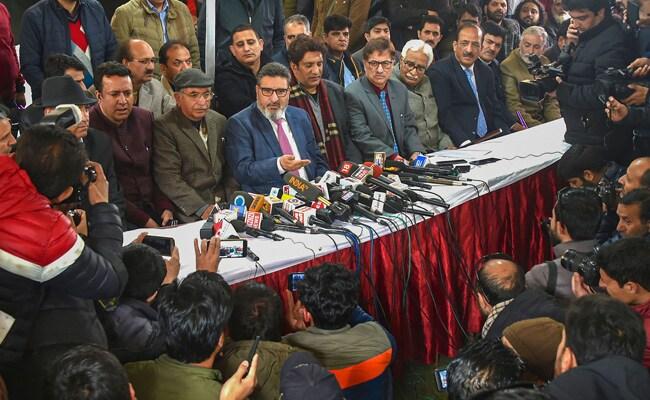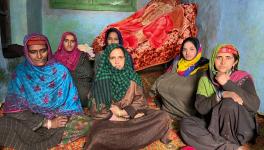Bukhari’s Apni Party: Delhi’s Arm or Remains of PDP?

Srinagar: At a time when three former chief ministers of the erstwhile state of Jammu and Kashmir are serving detention under controversial Public Safety Act (PSA), scores of politicians led by businessman-turned-PDP politician Altaf Bukhari launched a new political outfit Jammu and Kashmir Apni Party (JKAP) on Sunday.
The party was launched amid heavy security vigil at Bukhari’s residence in Lal Chowk. Bukhari read out a three-page “declaration” to the media as he sat amid the defected leaders from National Conference, Congress party and mostly from Peoples Democratic Party (PDP) including former MLAs Dilawar Meer, Rafi Mir and Ghulam Hassan Mir, PDP’s founding member who later distanced himself from the party. The politicians were released four months after they were detained under preventive measures by the government in the wake of the abrogation of Article 370 in August 2019.
At the launch, Bukhari was also flanked by former-militant-turned-counter-insurgent-turned-politician Usman Majeed, a two-time MLA from North Kashmir’s Bandipora constituency. A member of the Indian National Congress, Majeed resigned from the party earlier in February. In the nineties, Majeed is believed to have crossed over to Pakistan for arms training before he came back and surrendered in front of security forces. He later worked under Kuka Parrey, a ruthless leader of a dreaded state-backed militia – Ikhwan, before joining politics.
Apart from most of the former MLAs from Congress and PDP, at least two former Members of Legislative Council (MLCs) from NC, Vijay bakaya and Asghar Ali, have also joined Bukhari’s latest political venture.
Like BJP, Bukhari also accused existing regional parties NC, PDP of “family rule”. “Apni Party will not follow family rule. The leader of the party cannot continue for more than two terms. This party is of the commoners, by the commoners for the commoners,” he said.
Bukhari, who was elected as the first president of the party, said the demands and issues which the party discusses are similar to that of the central government led by BJP. “We cannot create our own issues; they are ours more than the Centre’s… We have to do business with them,” Bukhari said.
A rich businessman, who owns multiple business ventures including food processing and fertilizers, Bukhari was the richest candidate to contest last Assembly elections in 2014 with revealed assets worth Rs 85 crore. Bukhari won after contesting from commercially important Amira Kadal constituency and served as minister for finance in the PDP-BJP coalition government.
Despite joining politics later, Bukhari is believed to have played key role in several political developments in the region including in toppling of the Farooq Abdullah’s government in 1984—who was replaced by his brother-in-law, G M Shah.
“The new amalgamation has the same leaders who have helped anti-democratic forces to pull down democratically elected governments in J&K. The members who joined the new group are the same who pulled down Dr. Farooq’s government in 1984 to cobble up with the Centre,” NC’s spokesperson Imran Nabi said.
Earlier last year, following the National Investigation Agency (NIA) crackdown on separatist politicians, the agency had also interrogated Bukhari’s brother Tariq in a case related to “terror funding”. Bukhari, too, was questioned many a time in this case since 2006.
Bukhari’s Apni Party is, however, being seen as an extension of New Delhi’s arm in the region, a deja vu moment. Some even equated Bukhari to former J&K Prime Minister Bakshi Ghulam Mohammad who led a coup against Sheikh Abdullah at the behest of Delhi government following which Abdullah spent nearly 11 years in jail.
Even as the party declaration begins with the mention of 1990s, unprecedented scenarios and realities of the region, the party has remained silent on core issues of Kashmir wrestled by both India and Pakistan for years.
“The party will seek to secure the restoration of J&K’s statehood, protection of domicile rights specially with respect to disposition of land and employment in government services and dignified return of Kashmiri politicians,” the declaration said.
This declaration comes after heads of regional parties resolved to fight for the special status of J&K in what came to be known as “Gupkar declaration”.
As Jammu and Kashmir’s special status was revoked and it was downgraded to a union territory, BJP leaders including Ram Madhav, who in October last year during his first visit after the abrogation, stated that the politics of restoration of statehood and security of jobs for state subjects is legitimate and this is what these regional parties and politicians should focus on—something that Bukhari seems to have initiated.
For now, Bukhari’s Apni Party grapples with the same “credibility” issues, faced by PDP since its creation in 1998—also seen as New Delhi’s arm against NC back then. Despite its successful “healing touch” policy in the first tenure between 2003 and 2005, PDP was always been referred to as a group of “political opportunists” rather than a band of ideological brothers. Apni Party, many say, is a similar sight.
Get the latest reports & analysis with people's perspective on Protests, movements & deep analytical videos, discussions of the current affairs in your Telegram app. Subscribe to NewsClick's Telegram channel & get Real-Time updates on stories, as they get published on our website.
























